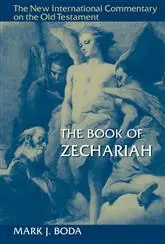

The Book of Zechariah
in New International Commentary on the Old Testament
Pages
864
Publisher
Eerdmans
Published
2/11/2016
ISBN-13
9780802823755
The most up-to-date commentary on the biblical prophecy of Zechariah.
Over the years, Zechariah has suffered from many accusations of obscurity and has frustrated readers seeking to unlock its treasures. This commentary by Mark Boda provides clear insight into Zechariah's meaning with sensitivity to the historical, literary, and theological dimensions of this prophetic book of the Bible.
Boda presents a fresh translation of Zechariah based on the original Hebrew and offers detailed commentary to justify his translation and highlight the key themes of each passage. He addresses controversies surrounding the book even as he orients readers to the overall flow of the text and its theological significance.
A valuable tool for preaching and teaching, this new commentary supplies deep and thorough reflection on a too-often-neglected book of the Old Testament.
Over the years, Zechariah has suffered from many accusations of obscurity and has frustrated readers seeking to unlock its treasures. This commentary by Mark Boda provides clear insight into Zechariah's meaning with sensitivity to the historical, literary, and theological dimensions of this prophetic book of the Bible.
Boda presents a fresh translation of Zechariah based on the original Hebrew and offers detailed commentary to justify his translation and highlight the key themes of each passage. He addresses controversies surrounding the book even as he orients readers to the overall flow of the text and its theological significance.
A valuable tool for preaching and teaching, this new commentary supplies deep and thorough reflection on a too-often-neglected book of the Old Testament.
Collections
This book appears in the following featured collections.
- Basic Library Booklist by Detroit Baptist Theological Seminary
- Top Old Testament Commentaries by Engaging Scripture (Nijay Gupta's Substack)
Reviews
Quite possibly the premier technical commentary on Zechariah available today—whether critical or conservative. Boda does a superb job of integrating the best of critical scholarship with a robust exegetical approach that attends to structure, inner-biblical allusion, and theological significance. This is the first commentary I turn to for anything related to the complex yet fascinating book of Zechariah.
The Gospel of John records in 5:39 a saying by Jesus Christ: “… it is they (the Scriptures) that bear witness about me, …”. Would that saying sensitize thenceforth any would-be interpreters how they approach the Biblical texts?
If interpreters, while handling an OT text find it appropriate to engage with their fellow commentators, whether contemporary or ancient, how much more would it seem necessary for these same interpreters to also comment on those NT texts that make direct quotation or allusion to it?
The response to the above queries is at best ambivalent if one reads Mark J. Boda’s 2016 commentary on the book of Zechariah. Apart from a brief paragraph entitled “Zechariah For Today” (pg. 44), Boda largely eschews making any messianic references in his commentary proper. At various points, he expresses his apprehension of characterizing Zechariah’s vision reports as eschatological (pgs. 102, 211):
“ … there are reasons to see in Zechariah’s vision reports some of the ingredients that will be key components of the later apocalyptic form, it is not helpful to emphasize the connection, since the reading strategy associated with the later form cannot be imposed on the earlier form [vision reports that relate to recent events] without falling into anachronistic error”. (pg. 102, see also n.123)
Such warning is indeed perspicacious and prudent, as Boda demonstrates trenchantly the historical groundings and relevance of the prophet’s message to its late sixth to the mid-5th century audience. Questions remain, however, whether interpreters of OT prophetic texts are inescapably caught between mutually exclusive quandaries of imminent visions and apocalypses. Given his rather restrictive definition of “eschatological” (pg. 211), it is apparent that Boda sees the answer in the affirmative.
Apart from the above, Boda’s commentary on the Book of Zechariah is another (after his 2004 NIVAC) important contribution to the study of this prophetic book. He offers often exhaustive references to words used in other parts of the OT. His expert translation, explication of textual relationships, cogent exegesis and fair interactions with recent commentators are invaluable resources.
One cannot help after reading this substantial commentary but feel thankful and musing at the same time. There is an urge to turn to those quotations in the NT and ask: “what about …?” Were these NT writers mistaken? For a commentary in a series that claims its affiliation, and by inference its readership, in “evangelicalism”, there is an interpretative void yet to be filled.
This is definitely the most exhaustive commentary on Zechariah up to date. If you have a question about the text or background of Zechariah, this volume answers it. I definitely would not go to this first if you are needing something for a sermon, as it requires reading several pages of dense material to find anything of practical relevance. In my opinion, this is one of the best commentaries on Zechariah, up there with Meyers & Meyers' AYB Commentary.
Full disclosure: Mark Boda was one of my seminary instructors. That said, this is an objectively good commentary, though perhaps a bit too large for the series (only slightly shorter than the NICOT volume on the Psalms). Boda leaves no stone unturned, covering all the various readings and theories surrounding the tricky aspects of authorship and unity of the text, as well as historical setting and relationship to other post-exilic texts. This will likely become the standard Zechariah commentary moving forward.


